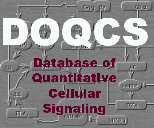 |  |  PP1_PSD PP1_PSD |
Enter a Search String | | Special character and space not allowed in the query term.
Search string should be at least 2 characters long. |
| | Kd is calculated only for second order reactions, like nA+nB <->nC or nA<->nC+nD, where n is number and A,B,C,D are molecules, where as for first order reactions Keq is calculated. Kd for higher order reactions is not considered. |
| | Name | Kf | Kb | Kd | tau | Substrate | Product | | 1 |
back_1 | kf
(s^-1) | 0
(#^-1 s^-1) | Not applicable** | - | CaMKII-PSD
| CaMKII
NMDAR
| | | Rates set by the translocation experiments of Shen and Meyer, Science 1999. | | 2 |
back_2 | kf
(s^-1) | 0
(#^-1 s^-1) | Not applicable** | - | CaMKII-thr305-PS
D
| CaMK-thr305
NMDAR
| | | Same as for back_1 | | 3 |
CaM-Ca3-bind-Ca | kf
(uM^-1 s^-1) | 10
(s^-1) | Kd(bf) = 21.5054(uM) | - | CaM-Ca3
Ca
| CaM-Ca4
| | | Use K3 = 21.5 uM here from Stemmer and Klee table 3. kb/kf =21.5 * 6e5 so kf = 7.75e-7, kb = 10 | | 4 |
CaMKII-bind-CaM-
PSD | kf
(uM^-1 s^-1) | 0
(s^-1) | - | - | CaMKII-PSD
CaM-Ca4-PSD
| CaMKII-CaM-PSD
| | 5 |
CaMKII-diss-CaM | kf
(s^-1) | 0
(uM^-1 s^-1) | - | - | CaMKII-CaM-PSD
| CaM-Ca4-PSD
CaMKII-PSD
| | 6 |
CaMKII-thr286-bi
nd-CaM-PSD | kf
(uM^-1 s^-1) | 0.1
(s^-1) | Kd(bf) = 0.0001(uM) | - | CaMKII-thr286-PS
D
CaM-Ca4-PSD
| CaMKII-thr286-Ca
M-PSD
| | | Same values as for the main compartment Can the main compartment pool of Ca/CaM be used? | | 7 |
Ca_stoch_cyt | kf
(s^-1) | 100
(s^-1) | Keq = 1(uM) | 0.005sec | Ca_control_cyt
| Ca
| | 8 |
Ca_stoch_PSD | kf
(s^-1) | 100
(s^-1) | Keq = 1(uM) | 0.005sec | Ca_control_PSD
| Ca-PSD
| | 9 |
endo_const | kf
(s^-1) | 0.0014
(s^-1) | Not applicable** | - | GluR23_M
| GluR23_I
| | 10 |
equilib | kf
(s^-1) | 60
(s^-1) | Not applicable** | - | CaM-Ca4-PSD
| CaM-Ca4
| | | Diffusional equilibrium between PSD- and cytosolic compartment. According to D. Bary in Cell Movements 2nd ed 2001 D for proteins is 5e-7 cm^2/s giving 10 ms for a translocation of 1 um. | | 11 |
Inact-PP1 | kf
(uM^-1 s^-1) | 0.1
(s^-1) | Kd(bf) = 0.0002(uM) | - | I1*
PP1-active_PSD
| PP1-I1*
| | | K inhib = 1nM from Cohen Ann Rev Bioch 1989, 4 nM from Foukes et al Assume 2 nM. kf /kb = 8.333e-4 | | 12 |
PKC-stoch-input | kf
(s^-1) | 2.5
(s^-1) | Keq = 1(uM) | 0.2sec | PKC-control
| PKC-active
| | 13 |
Stoch_Basal_
CaMKII_PSD | kf
(s^-1) | 1
(s^-1) | Keq = 1(uM) | 0.5sec | basal_CaMKII_
PSD_control
| basal_CaMKII_
PSD
| | 14 |
transloc_1 | kf
(#^-1 s^-1) | 0
(s^-1) | Not applicable** | - | CaMKII-CaM
NMDAR
| CaMKII-CaM-PSD
| | | Rates to match curve in fig2 from Shen and Meyer, Science 284:162-166(1999), calculated for 6:1 alpha:beta CaMKII heterodimers | | 15 |
transloc_2 | kf
(#^-1 s^-1) | 0
(s^-1) | Not applicable** | - | CaMKII-thr286*-C
aM
NMDAR
| CaMKII-thr286-Ca
M-PSD
| | | Same as for transloc_1 | | 16 |
turnover | kf
(s^-1) | 1
(s^-1) | Not applicable** | - | AMPAR_bulk
| A_B
| | | Represents both synthesis and degradation of the receptor. The rate is set to be rather fast for now. The forward rate also includes scaling terms because the AMPAR_bulk is in the dendritic volume of 5e-18. This means that we need to lower Kf to account for the difference in volumes. Effectively Kf is 1/sec, but the scaled version becomes 9e-20/5e-18 = 0.018 |
** This is a trasport reation between compartments of different volumes. Therefore Kd is not applicable. Please Note Kf, Kb units are in number of molecules instead of concentration.
Pathway Details Molecule List Enzyme List Reaction List
| Database compilation and code copyright (C) 2022, Upinder S. Bhalla and NCBS/TIFR
This Copyright is applied to ensure that the contents of this database remain freely available. Please see FAQ for details. |
|
